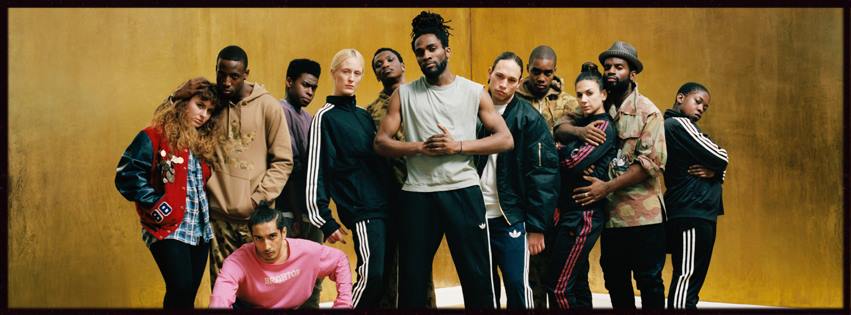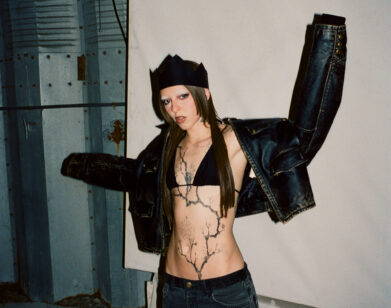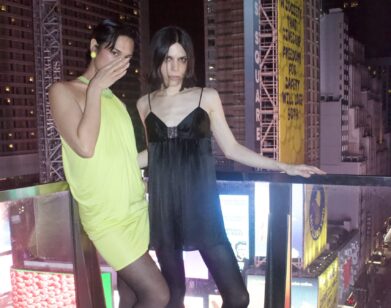Jungles Abroad

ABOVE: JUNGLE
When two friends began writing songs for a soul-funk project called Jungle in 2013, they spent a lot of time imagining where those songs would be played. In interviews and online bios, they spell out a narrative of police cars chasing through gritty streets and neon-lit beaches—think Harmony Korine’s Spring Breakers or Grand Theft Auto—when describing a scenario for their aptly-named single “The Heat.”
“We wanted to know: ‘What would that sound like? And what do I have to do personally to react to this bit of music so I can take myself there?'” explains Tom McFarland, one half of the band’s core songwriting pair. Having grown up together in the eclectic West London neighborhood of Shepherd’s Bush, McFarland and bandmate Josh Lloyd-Watson were considerably cultured by the time they started Jungle, although they’d never visited many of the places they wrote about.
As it turns out, envisioning crime-ridden beaches in Miami and spiraling fluorescent tunnels in Tokyo’s underground had its benefits in the real world. One being a self-titled debut album that became nominated for the Mercury Prize award last month, alongside lauded artists like FKA twigs and Damon Albarn. The other happened to be a spot opening for Pharrell at the 2014 iTunes Music Festival. Real-life accolades aside, it seems as if Jungle would rather continue to entertain dreams as analogues of their fantasy selves—rather than dissect the fantasy itself.
Which is why it was a rare moment when Interview caught McFarland in Los Angeles on the opening night of Jungle’s North American tour. Chatting in the tour bus that houses the band’s seven members, including McFarland and Lloyd-Watson, we discussed the band’s swift evolution from unsigned band to Mercury Prize nominee. Read on below for our interview.
JOY SHI: Congratulations on the Mercury Prize nomination. What was your initial reaction?
TOM MCFARLAND: A little bit of shock. It’s something we’d dreamt of, but dreams and expectancy are different things. I think expectancy is a very negative thing to have in your system as a human, where dreams motivate you to do better things, like push yourself and your boundaries and limits. When we wrote the record we were really happy with it, so naturally we thought it had a shot, but there were some really incredible albums out there; it’s been a really strong year for alternative music in the U.K. We’re very honored and very privileged.
SHI: Did you guys do anything to celebrate?
MCFARLAND: We did the show with Pharrell on the day we found out. We had a couple of glasses of champagne then, but we had to be up at like four in the morning to go to Croatia the next day.
SHI: If you were to win the Mercury Prize, do you have any sort of plans for the money?
MCFARLAND: We definitely would pump it straight back into what we do. We love equipment. We’re geeks, basically, so it’s an opportunity to spend some money on studio gear that will help make the next record sound even deeper and better than this one. That’s the plan, now that we have perspective on this record as listeners as well as creators. And maybe a nice holiday.
SHI: Your fellow U.K. nominees this year are all very talented. How do you think the London music scene is different from America’s?
MCFARLAND: There’s a massive market near where we live in Shepherd’s Bush, and the first thing you walk past is this bootleg reggae CD store, and the next town you have loads of Indian fabric shops and a big Irish community as well. I think from a very young age I was overwhelmed by cultures that weren’t necessarily mine—and London really thrives on that and accepts that. As an artist and a musician, you just learn to live with no boundaries as to what you can interact with musically or creatively.
SHI: You’ve been making music with J since your childhood and had a lot of demos to work with. How did you not get overwhelmed or lost in all you’d created in the past when you set out to make Jungle’s debut record?
MCFARLAND: We weren’t sitting there with a bunch of Jungle-esque ideas for a long time. We never finished anything that was really exciting for us until the first couple of Jungle tracks. The first track we finished was called “Son of a Gun” and the other two followed swiftly after that. We knew we’d found a sound that was pretty cohesive and fun. We really enjoyed it and we found some inventive methods of making things. Like, instead of using a snare drum and recording it really well, we got a really shitty mic and recorded crushing a Coke can and recorded throwing keys on the table.
SHI: Were you signed at that point?
MCFARLAND: No, we weren’t signed until December 2013. Before then we were writing and releasing records by ourselves and with a small label called Chess Club. We did “Platoon” and “Heat” in June and September respectively, and then we were picked up in December for the album and we finished that in March.
SHI: That’s a very quick turnaround.
MCFARLAND: We were really keen to capitalize on the progress we were making. I think if we’d waited for this album to come out now in the fall, we wouldn’t be where we are, we’d be six months behind.
SHI: There’s definitely a very R&B and electro-funk vibe to this record, yet it can sound like so many other things at once.
MCFARLAND: Sampling was really important to us, but we didn’t want to sample other people, we wanted to sample ourselves. So we kind of had to write classic soul songs in order to cut them up and turn them into modernized tracks that people didn’t understand fully and completely.
SHI: Is that sound going to stay the same in the future?
MCFARLAND: It could really go anywhere. There’s a lot of soul and a lot of funk from my upbringing and my ideas as a melody writer and a listener. I love soul melodies and how they put their tracks together and the arrangements. And J was always massively into French electro and French hip-hop, the Daft Punks and Justices and AIR. We really connected with that first AIR record, Moon Safari, and equally Moby’s Play. That was the first time we heard electronic music that was emotional and soulful and had human elements in there that you could really connect with as a listener, writer, and artist. The way we approach production comes from anything like Kanye West to Jai Paul, who did everything in his bedroom and showed us we could do it ourselves and you didn’t need a big studio.
SHI: So you’ve self-described as big visualizers when making music. What are some other imagined scenarios that informed Jungle?
MCFARLAND: A lot of them were inspired by places we’d never been to. It’s about finding places in our heads that we want to explore sonically and that really makes your imagination live. When British people look at America, South America, and the Far East, we have a very romanticized, Hollywood vision in our heads, whether that’s from computer games or movies. So it was kind of like escaping into a little film inside our heads when we were writing. J rides motorbikes quite a lot in London, so I always find myself on the back of a motorbike. The song “Accelerate” is about that for us, trying to get away from where you are and to push yourself forward. For us, that vision is like riding through this crazy neon-lit, Tokyo tunnel on this like, crazy superbike.
SHI: Where do you want to go on the next album?
MCFARLAND: I think maybe we’re going to try and go somewhere more rural in our heads. What does Africa sound like? We didn’t explore that, necessarily, on this record. It’s just a case of how Western culture and American culture is so easy to reference. And that’s what we love doing—we love the fact that we can do that, and that we have the liberty and freedom to explore that.
SHI: What kind of a live experience can people expect from this tour?
MCFARLAND: Well, it’s the first time we’ve been to the States with seven people, and we’ve got an incredible lighting guy with us. Bigger and better, I hope. I think playing festivals helps with your confidence with a big crowd, playing to their strengths, which I think is a really important thing for an artist—to understand your audience from the start of the set and see if they’re tired or if they’re up for it, and to tailor how you interact with them, because you feed off their energy.
SHI: You’ve expressed your affection for pop music, and that you’d like to make music for the people. Who would you say your listeners are made up of?
MCFARLAND: It seems to be pretty universal. We’re trying to make music that can connect with more than just a subculture. You find yourselves having fans who are 50 and fans who are 15, and obviously they react differently. But I hope that we appeal to a massive variety of people because there are so many influences in our music and we try not to alienate people by making things too complicated or ideas that are too niche. I hope we’ve created a modern sound that excites kids, because at the end of the day, we are young and part of a generation where computers are such an incredible tool.
JUNGLE PLAYS AT IRVING PLAZA TOMORROW, OCTOBER 2. FOR MORE ON THE BAND, VISIT ITS WEBSITE.






